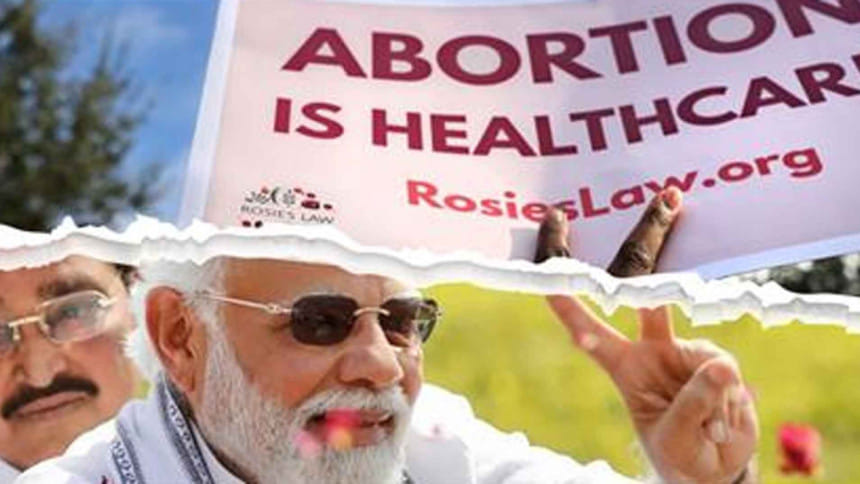How the politicisation of courts and judgements weakens democracy

Two verdicts in two different countries, located thousands of miles apart, by their respective supreme courts last week have stoked a serious debate about the role of judges and politicisation of the judiciary. Both these countries are known to be models of democracies – one for unfettered freedom of speech and the other for the vast number of its constituents. Both these verdicts have huge implications on the future of democracy beyond their borders, as the disputes involved religion and politics.
One of these two verdicts was in the United States. A nearly 50-year-old ruling which had given women reproductive freedom was reversed, which has shocked the majority and drawn criticism from world leaders, but has bolstered American conservatives and anti-abortion Christian faith groups. The appointment process of the US Supreme Court justices is known for its notorious political exercises.
The other verdict was in India, in which the Supreme Court has not only given Prime Minister Narendra Modi a clean chit for his role during the anti-Muslim riots in 2002 in Gujarat (during which he was the state's chief minister), but has also chided the victims for seeking justice. Some opposition parties and human rights activists have expressed their outrage and, as in the US, have pointed out that the latest decision is quite the opposite of the same Court's observation passed 18 years ago.
The harshest criticism of the US Supreme Court's judgement allowing states to deny the right of women to terminate their pregnancies, however, came from within the bench, as the three dissenting Justices (Stephen Breyer, Elena Kagan, and Sonia Sotomayor) stated that the majority's decision "undermines the court's legitimacy." Leading newspapers published editorials and opinion pieces questioning the politicisation of the highest court. Under the headline "The Politicization of the Supreme Court Is Eroding Its Legitimacy," Peter Coy wrote in The New York Times, "People on the losing end of Supreme Court decisions increasingly feel that justice is not being served. That's a scary situation for the high court, and for American democracy in general." Writing in the The Washington Post, columnist Max Boot noted, "Everyone knows that the Founders were afraid of the tyranny of the majority. That's why they built so many checks and balances into the Constitution. What's less well known is that they were also afraid of the tyranny of the minority." And, his column bears the title: "The Supreme Court rulings represent the tyranny of the minority." This view is not unexpected, as a Gallup poll, conducted mostly after the draft of a Supreme Court decision addressing abortion rights was leaked, found 55 percent Americans now consider themselves as being pro-choice.
World leaders who have criticised this verdict include Canada's Justin Trudeau and Britain's Boris Johnson. Acknowledging global concerns about how the verdict will impact others around the world, the US Secretary of State, Anthony Blinken, issued an unusual statement on a domestic legal issue by saying, "Today's decision overturning Roe v. Wade has raised understandable questions and concerns across the world and within our workforce." He then promised that his Administration would remain fully committed to helping provide access to reproductive health services and advancing reproductive rights around the world.
Given the scale of jubilation and protests among anti- and pro-choice supporters in the US and other countries, political wrangling over this issue is unlikely to end anytime soon. Instead, political pundits have suggested that the upcoming midterm elections in the US will be more divisive and acrimonious.
The other verdict, delivered by the Supreme Court of India, had an almost instantaneous reaction. The apex court in its ruling upheld a clean chit given to the then Gujarat chief minister, Narendra Modi, in the Gulberg Society massacre case and rebuked the appellants, the widow of slain Congress MP Ehsan Jafri, and supported by human rights activist Teesta Setalvad, saying the "pot" was kept "boiling" for "ulterior design." The use of these terminologies by top judges has shocked opposition politicians and jurists in India. They have pointed out the fact that another bench of the same Court in April 2004 observed, "The modern-day Neros were looking elsewhere when Best Bakery and innocent children and helpless women were burning, and were probably deliberating how the perpetrators of the crime can be protected."
The Indian Supreme Court's new observation also indicates that the Court wanted them to be punished. And the results were predictable and quick. Citing the observation of the verdict, Gujarat police have arrested human rights defender Teesta Setalvad and former police official RB Sreekumar in a lightning response.
Rights groups have termed Setalvad's arrest as reprisal and say that it sends a chilling message to the civil society and further shrinks the space for dissent in India. Writing in the online portal, The Wire, Professor Apoorvanand of Delhi University says, "What the present Supreme Court has done is unpardonable. It has made the victims of the alleged state-sponsored violence lonely. It has issued a threat that they cannot seek the help of the human right workers. And it has warned the human rights workers: do your work at your own risk."
The significance of the Indian Supreme Court's verdict cannot be overstated as the precedents it sets often become references for the rest of our subcontinent. And, it comes against the backdrop of ever-increasing concerns about the politicisation of our judiciary in tandem with the weakening of democracy.
Kamal Ahmed is an independent journalist and writes from London, UK. His Twitter handle is @ahmedka1

 For all latest news, follow The Daily Star's Google News channel.
For all latest news, follow The Daily Star's Google News channel. 



Comments